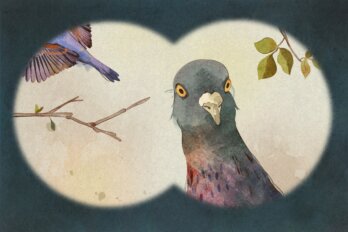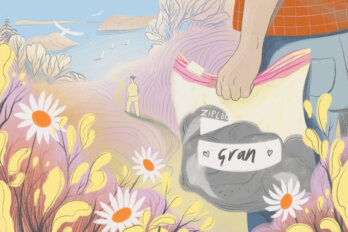Since the 1950s, the global average fertility rate has fallen from five children per woman to 2.5, and it is projected to fall to 2.1 in 2050.
The average birth rate has dropped below one child per woman in South Korea and Puerto Rico.
One in five women in their late forties in England, Wales, Germany, and the Netherlands do not have children.
One in four women in their late forties in Italy and Switzerland do not have children.
Three in ten women in Japan, Hong Kong, and Singapore do not have children.
Forty-four percent of Americans surveyed, aged eighteen to forty-nine, say it is not likely they will have children someday.
I’m one of them—the people without children. Only in my mid-twenties and already married did I realize I had always thought of childlessness as a destination. I knew I wanted to go there, but I had never asked myself what would happen once I arrived. Now that the future of someone I loved would also be shaped by my intent not to have a child, it suddenly felt urgent to understand what it would be like not just to pass through but to live in that childfree place for the rest of my life. Back then, no woman I knew had lived or wanted to live without being a mother, so I inched closer to this life without motherhood in total darkness, relying solely on my intuition. Whenever I considered increasing my pace, waves of fear, suspicion, and isolation followed in quick succession. I feared what I couldn’t see; I suspected the journey ahead would be miserable, and I imagined dying alone in a decrepit house without anyone noticing for days.
The bleakness of my imagined future eclipsed what I knew about myself and eroded my confidence, making me doubt I knew what was best for me. Soon, I was not advancing but regressing, wondering if I should be on that path at all. How much of what I imagined was true? And what had made me believe a life without children of my own would be a horrible one?
I thought about it and realized it was all due to having no role models to tell me otherwise. Not just in my family or circle of friends or acquaintances—but anywhere. And that’s because a woman’s life without children is rarely told in literature, cinema, or the media. When told, it is presented as a counter example of what brings contentment to humans or is distorted into stereotypes. You know the ones: the crazy cat lady, the sorrowful barren woman, the selfish childfree woman, the overambitious career woman, the child hater, the pitiful spinster, the immature woman, the incomplete woman, the cold-hearted woman, the unnatural woman, and so on. It’s no wonder that such a set of pejorative terms for childlessness repeated across various cultural channels had led my brain to present me with doomed scenarios that did nothing but cause panic and paralysis.
The year 2009. It was Christmas week. The traditional Swedish seven-arm candle holder and a little Santa Claus were on display by the window of our flat in Lund. A fragrant cloud of clove, nutmeg, and cinnamon wafted from our mugs of mulled wine as I pressed “Play” on the remote control.
My husband, Erik, and I were watching a movie about a grief-stricken man who had to learn to care for his daughter after his wife died, and I noticed Erik crying. I knew which scene had hit a nerve: the one where the man consoles his little girl and realizes that his bond with his child is stronger than the one with his wife. Comforting Erik in my arms, I stayed silent. So did he. No words were needed.
There had been other signs before, subtler ones. But I had brushed them off, certain that the case was closed. We had talked about it from day one. And by day one, I mean the first time we heard each other’s voices on an MSN call and talked about all the big things in life, including families—the ones we came from and the one I didn’t plan to have, at least not in the traditional sense of the word. He asked me why. I told him I just didn’t wish for it. That I wanted a different way of life. I then asked how he felt about parenting, and he said he had never felt strongly about it and that his previous relationship had ended, in part, due to his ex-girlfriend’s pressure to get married and have children. They had been together for eight years, and they each wanted different things. At the time, I had interpreted this as confirmation that he didn’t want to have children either.
In the two and a half years since that first call, we had spoken a lot more about parenthood, but rarely had we discussed it as a real possibility, more as if confirming the agreement not to become parents. “Oh, they look so tired,” we’d say after spending time with our friends with kids. “If we had children, there’s no way we’d be flying overnight to Helsinki for a Bruce Springsteen concert,” we’d say on our way to the airport. Or maybe I was the one saying it and he was the one listening? I was no longer sure.
There was never any paper agreeing to this, but it was an agreement in my head from the start. I told him I didn’t understand what was happening. Why had he gone to such lengths, literally across the world several times, to be with me when he knew I wanted no children? Did he conceal his true wish thinking I’d change my mind? Did he believe back then that he would never want a child so we’d be fine?
Life, of course, is in no way that simple. I had changed a great deal in those three years. Wouldn’t it be only fair to accept that he had changed too? Maybe getting married and building a home together had sown the seeds for new yearnings to grow. What was I to do? I couldn’t ignore the fact that the person I loved the most was in pain. He sobbed when he finally disclosed that the desire to become a father, though not there when we met, had since crept into his mind and grown bigger and bigger until he no longer knew how to expurgate it. It wasn’t his fault. It was nobody’s fault. But realizing that we now wanted such different things was devastating for both of us. He felt guilty and conflicted, and I felt forced to reconsider something I had thought was already settled.
I held him close until the movie was over. Was our marriage over too?
Looking back on my early life helped me understand that not becoming a mother had presented itself as a magic shield that would protect me from the bad experiences of my mother and grandmother. So I held tight to it.
Up to that point, not having a child had made me feel like I had complete control of my adult life. And that was important to me, even if it wasn’t true. Continuing to have Erik by my side was also important to me. But my love for him needn’t be my only compass in life. I could shift my focus to the present and think about motherhood pragmatically, without inherited trauma and associations with domesticity and entrapment. After all, I was an educated woman in my late twenties, married to someone I loved, trusted, and respected and who reciprocated my feelings. I wasn’t earning much, but I was working in an area that I had studied, which gave me a lot of satisfaction. I lived in a cozy flat in a modern, secular country that supported new families in many ways. My husband, who did his fair share of house chores and cooked better than I did, wished to become a father and had pledged to be a hands-on dad in all aspects of parenthood. He had even mentioned he’d be up for being a full-time stay-at-home dad if I wished to prioritize my career and didn’t mind becoming the primary provider for our household. These were not circumstances in which my mother or grandmother had ever found themselves.
Unlike them—better even, because of them and the amalgamation of sacrifices they had made to raise me as they did—I had been given opportunities that allowed me to choose my path, which included options they never had. I could decide if, when, how, and with whom I’d have one or more children. First with their help and then as a product of my efforts, I had become my own person and was building my own life. I could let go of the shield for good now and move into my future without carrying a weight that was not mine.
With that in mind, many times that year, I pondered motherhood from a different angle by seriously considering the possibility that it could be a positive experience for Erik and me, both as a couple and individually. I tried to imagine someone who would be “the product” of our love, “the glue” that would keep us together, and “the legacy” we’d leave behind. I thought about how watching someone grow so closely could be a journey filled with endless tasks but also with immeasurable moments charged with bliss. I thought about the daughter of a friend of ours who had come to our house, and when I offered her the ice cream and cookies I had bought for her, thinking that’s what a three-year-old would want to eat, she had asked me for cucumber and plucked leaves from my basil plant. Would we have one of those cute cucumber kids too, if we were to have one at all?
I had really given it thought, but still, whenever I tried to envision what it would be like to bring another human being into this world and become half of the duo meant to raise, protect, and love it unconditionally until death did us part, I felt no inkling of interest or excitement to move in that direction. Not once.
How was that possible? Motherhood as the epicentre of women’s lives was all I’d ever witnessed, so how was it that the centre was not there when it came to my own life?
Was I hollow, or was my centre elsewhere?
The peaceful days Erik and I spent attending to our art forms and each other were everything to me. And I was happy with things exactly as they were. But Erik was older. Twelve years older. So my twenty-eight was his forty, and his clock was the one ticking, while I just wanted to make time stop.
In the twelve months since that first night spent awake by the window, I had told Erik that I didn’t want a baby, and he had repeatedly said he wanted me more than a baby. At first, all seemed well enough, but I gradually started to sense a deep sadness in him. The sadness extended into withdrawal, and I didn’t know how to bring him back.
Longing for a resolution and assuming the reason for our marital discontent was the limbo state of not knowing if I’d change my mind in the future about having a child, I started considering permanent contraception options. One made available about that time was Essure, a non-incisional birth control system that used small devices to block the fallopian tubes. Considering my near phobia of doctors and hospitals, that minor procedure seemed like a good compromise compared to major surgeries, such as tubal ligation or hysterectomy.
To my surprise, my mother, Yara, returned for her second visit to Sweden later that year. Maybe she’d noticed something was off between Erik and me. During her week-long stay, we exchanged tales about her life before and after my birth and my life before and after I left her house.
At some point, sitting on a bench next to a cathedral and sharing a ham and egg salad sandwich, I mentioned that I was considering going through a procedure that would permanently implant a birth-control device in my body, but that I wanted to do some more research after reading about a campaign by women who reported side effects the implant was having on their health, sex lives, and ability to work.
“What kind of side effects?” she asked.
“Skin rashes, joint pain, fatigue, hair loss, and, in some cases, perforation of the uterus.”
“Oof . . . it sounds dangerous. Why would you risk any of it?”
“Because I’m tired of trying to convince myself I want to have a child.”
“What’s the latest from Erik on this?”
“He said he no longer wants a child.”
“Doesn’t that alleviate the pressure?”
“I don’t believe him.”
“Why not? Why would he lie?”
“He’s not lying. He’s sacrificing his wish to have a child to be with me.”
The sacrifice. There it was again. I had developed an irreversible resistance to sacrifices after growing up hearing my mother list all the ways in which she had sacrificed herself for me: to feed me, to shelter me, to send me to the best schools, to university, and to allow me all the privileges she never had. I could acknowledge them and be grateful for them. I knew they had been made out of love. But I also knew where that road led: to resentment on both sides. And I was terrified that Erik and I would one day have a conversation ending with him saying he had given up on fatherhood for me because he loved me. And that he now regretted that decision. But I wasn’t ready to share this with my mother yet.
After she left, I talked about it with Erik. He and I agreed that the way forward was for me to believe him when he said that I was the family he wanted, and that if I didn’t want to become a mother, a life without a child was right for us. There was no need to undergo risky procedures or to drive myself mad. We would be fine. We would go back to finding purpose in our vows, verses, and notes. We would go back to each other.
Adapted and excerpted from Others like Me: The Lives of Women without Children by Nicole Louie. Copyright © 2024 Nicole Louie. Published by House of Anansi Press. Reproduced by arrangement with the publisher. All rights reserved.





